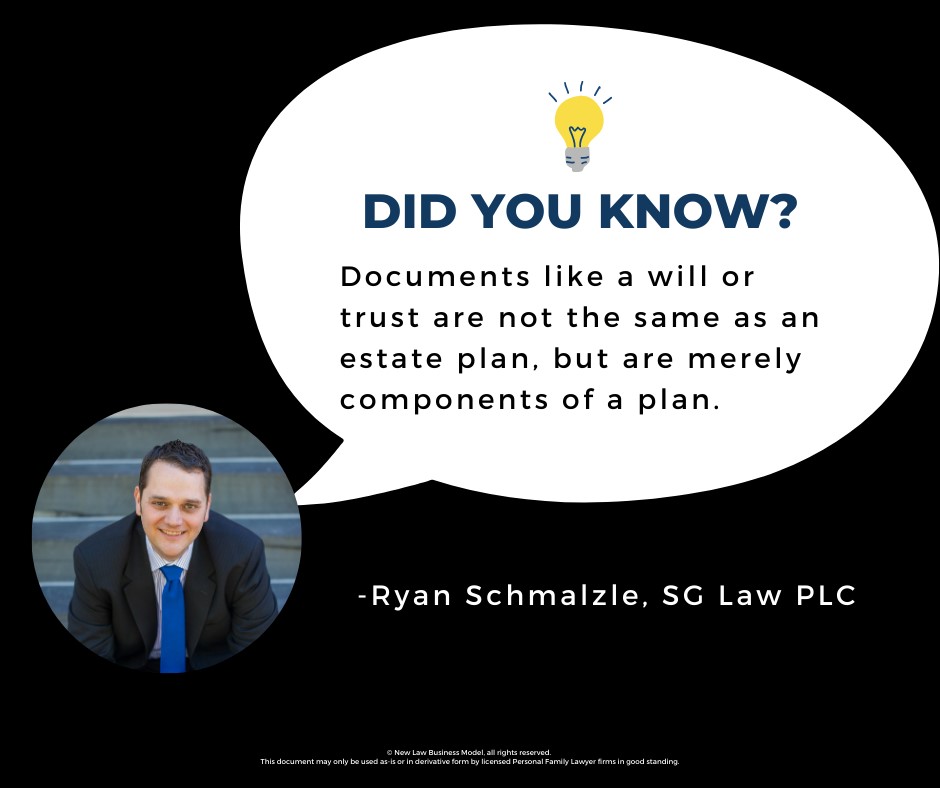Have you ever heard horror stories about families fighting over Grandma’s jewelry or getting stuck in a never-ending legal battle after someone passes away? Or about how long it can take to sell a house tied up in the court process? What about family members being denied their inheritance completely? Unfortunately, these situations happen every day. Not even the rich and famous are immune! A simple Google search will pull up dozens of celebrity stories about all the conflict that ensues after they die.
But most people don’t realize these things are avoidable – if you understand the process. So, if you’ve thought about creating a will or trust to avoid these outcomes, let’s ensure you’re fully aware of what’s at stake first. We’ll use a food analogy throughout this article, so our apologies if we make you hungry.
Lasagna as an Example of the Difference Between a Will or Trust and an Estate Plan
Let’s start by clarifying what we’re talking about. You’ve likely heard the term “estate planning” many times, but do you really understand what it involves? Contrary to popular belief, estate planning isn’t just about creating documents like a will or trust. While these are important, they’re only one part of a much bigger picture.
Think of estate planning like making a favorite recipe—let’s use lasagna as an example. A lasagna recipe has multiple components: the ingredients, the quantities needed, and the steps to turn those ingredients into a delicious dish. Without the steps, the ingredients alone won’t create anything—they’re just sitting there.
Estate planning works the same way. Your estate plan is the recipe, and the documents, such as a will or trust, are the ingredients. A will might be the pasta, and a trust could be the sauce, but by themselves, they don’t make the lasagna. You need all the pieces to work together, following a clear process, to create something meaningful. Without that process, the documents are just words on paper.
A common misconception is thinking the documents themselves are the estate plan. Many people—and even some lawyers—believe that simply drafting and signing these documents is enough. Unfortunately, this oversimplification leaves critical gaps. Financial “experts” and do-it-yourself platforms like LegalZoom have further fueled this myth, offering tools that focus solely on creating documents rather than building a comprehensive plan. Even AI has entered the mix, reinforcing the idea that documents are the whole story.
Most of these people and companies focus solely on the documents—the ingredients—not the recipe. They’ll tell you about some (and often not even all) of the pieces you need, but they won’t guide you through the process of putting it all together. The result? The kinds of messes we hear about all too often: families ending up in court, conflicts over sentimental items, prolonged delays in selling property or distributing assets, and even hefty, unnecessary tax and attorney bills.
To truly protect your loved ones and ensure your wishes are honored, you need more than just a collection of documents—you need a comprehensive estate plan. A real plan doesn’t just list the ingredients; it explains how much of each is needed and what steps to take to achieve the desired outcome. It’s the difference between handing someone a box of pasta and sauce and showing them how to make lasagna.
If you don’t create a complete, thoughtful plan—or if your current plan is incomplete or outdated—the state has a default plan waiting for you. This plan, dictated by your state’s laws, may look nothing like what you would have chosen for yourself or your loved ones. For example, I have clients that live in both Virginia and Maryland. The state’s/commonwealth’s default plan is significantly depending on which side of the Potomac you live on! Taking the time to craft your own plan ensures your family won’t have to navigate unnecessary complications, and it gives you peace of mind knowing your wishes will be carried out smoothly and efficiently.

Your State’s Recipe for Lasagna May Be Gross
To illustrate the difference between the State’s plan for you and one you can create for yourself, let’s get back to our lasagna example.
Let’s say the State’s recipe for lasagna includes spicy sausage, but you can’t tolerate spicy foods. The state’s plan may contain meat, but you’re a vegetarian. Or, it could be that the State’s recipe includes mushrooms, but your child is allergic to mushrooms. Some ingredients may be missing altogether, and the recipe will probably tell you that you can’t even cook the lasagna for months, or even years (goodness, your family will be hungry!). Whatever the situation, it’s possible that the State’s plan includes some component that you don’t like, or even one that could be disastrous to your family.
In reality, your State’s plan says how your assets will be distributed, who will get them and in what amounts. It requires a court process, which can be lengthy and expensive, and sometimes assets are frozen until the court process is over. It’s also set up for conflict, as your family members – even if you’re estranged – are required to get notice of the court proceedings, what assets you have, and are invited to make a claim for your assets. You may not like any of this.
If not, here’s the good news. The law also says you can create your own plan and decide on your own who you want to inherit your assets and how. If you create your own plan, you can decide to give money to charitable causes that matter to you if you want, which the State’s plan does not allow for. And if you create your own plan, you can also decide whether you want your loved ones to go through the court process. Yes, the court process can be optional.
What Recipe Do You Want to Use?
By creating your estate plan, you get to choose your lasagna recipe. You get to choose whether you want meat or veggie, mild or spicy sausage. You get to exclude ingredients your family members may be allergic to. You even get to decide if you want to share your lasagna with someone else. And you get to decide when to cook the lasagna, whether you want it to be eaten tonight or assembled, frozen and saved for another day.
It’s entirely possible that you don’t think the State’s recipe is gross and you wouldn’t change a thing. But you won’t know that until you know the details of the State’s plan and how those details pertain to you, your assets, and your family. Or, it could be that you think the State’s recipe is completely gross and you want to pick one that you and your family like. Either way, know what you want to create and be clear on how to do it, and do it correctly. Luckily, we can help.
How We Help You Get It Right
We’ve seen too many families suffer negative, yet unnecessary, consequences after a loved one dies. And if you haven’t experienced it yourself, chances are you probably will. But with the proper education, beginning with correcting the misconception that estate planning and the documents involved are one and the same, we believe we can break the cycle of strife.
As a Personal Family LawyerⓇ Firm, we start with education so you are clear on what the State’s plan is for you, and what you can do to create your own plan that aligns with your values, your goals, your family, and most importantly, that it works when you need it to.
We call it Life & Legacy Planning, and once you’ve created your Life & Legacy Plan, you can rest easy knowing your wishes will be honored, your loved ones cared for, and your property protected. Book a call with us today to learn more.
Use this link to schedule a complimentary 15-minute consultation:
*Please note that these information sessions are exclusively dedicated to Life & Legacy planning. If you need to schedule a consultation for other matters, please contact us here.
This article is a service of SG Law PLC, a Personal Family Lawyer® Firm. We don’t just draft documents; we ensure you make informed and empowered decisions about life and death, for yourself and the people you love. That’s why we offer a Life & Legacy Planning Session™, during which you will get more financially organized than you’ve ever been before and make all the best choices for the people you love. You can begin by calling our office today to schedule a Life & Legacy Planning Session™.
The content is sourced from Personal Family Lawyer® for use by Personal Family Lawyer® firm leaders, a source believed to be providing accurate information. This material was created for educational and informational purposes only and is not intended as ERISA, tax, legal, or investment advice. If you are seeking legal advice specific to your needs, such advice services must be obtained on your own separate from this educational material.

